AMD Radeon HD 7870 GHz Edition & Radeon HD 7850 Review: Rounding Out Southern Islands
by Ryan Smith on March 5, 2012 12:01 AM ESTOverclocking: Power, Temp, & Noise
As with the rest of Southern Islands, AMD is making sure to promote the overclockability of their cards. And why not? So far we’ve seen every 7700 and 7900 card overclock by at least 12% on stock voltage, indicating there’s a surprising amount of headroom in these cards. The fact that performance has been scaling so well with overclocking only makes overclocking even more enticing. Who doesn’t want free performance?
So how does Pircairn and the 7800 series stack up compared to the 7700 and 7900 series when it comes to overclocking? Quite well actually; it easily lives up to the standards set by AMD’s previous Southern Islands cards.
| Radeon HD 7800 Series Overclocking | ||||
| AMD Radeon HD 7870 | AMD Radeon HD 7850 | |||
| Shipping Core Clock | 1000MHz | 860MHz | ||
| Shipping Memory Clock | 4.8GHz | 4.8GHz | ||
| Shipping Voltage | 1.219v | 1.213v | ||
| Overclock Core Clock | 1150MHz | 1050MHz | ||
| Overclock Memory Clock | 5.4GHz | 5.4GHz | ||
| Overclock Voltage | 1.219v | 1.213v | ||
Overall we were able to push our 7870 from 1000MHz to 1150MHz, representing a sizable 15% core overclock. This is now the 3rd SI card we’ve hit 1125MHz or 1150MHz – the other two being the 7970 and the 7770 – so AMD’s overclocking headroom has been extremely consistent for their upper tier cards.
As for memory overclocking, we hit 5.4GHz on both cards before general performance started to plateau, representing a 12.5% memory overclock. Considering that both cards use the same RAM on the same PCB, and the performance limitation is the memory bus itself, this is consistent with what we would have expected. With that said, we are a bit surprised that we got so far over 5GHz on 2Gb GDDR5 memory chips only rated for 5GHz in the first place; it indicates that Hynix’s GDDR5 production very mature.
With that said, because of the unique and non-retail nature of the 7850 AMD supplied us, the 7850 overclocking results should be considered low-confidence. The retail 7850 cards will be using simpler and no doubt cheaper coolers, PCBs, and VRMs; all of these can reduce the amount of overclocking headroom a card has. It’s by no means impossible that a 7850 could hit 1050MHz/5.4GHz, but it’s far more likely on a 7870 PCB than it is on a 7850 PCB.
Anyhow we’ll take a look at gaming performance in a moment, but in the meantime let’s take a look at what our overclocks do to power, temperature, and noise.
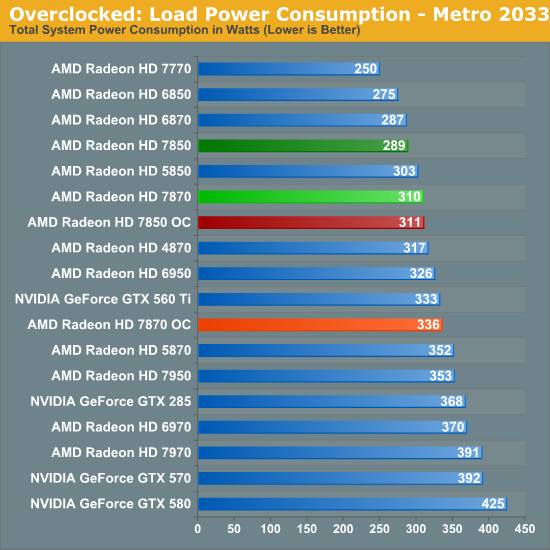
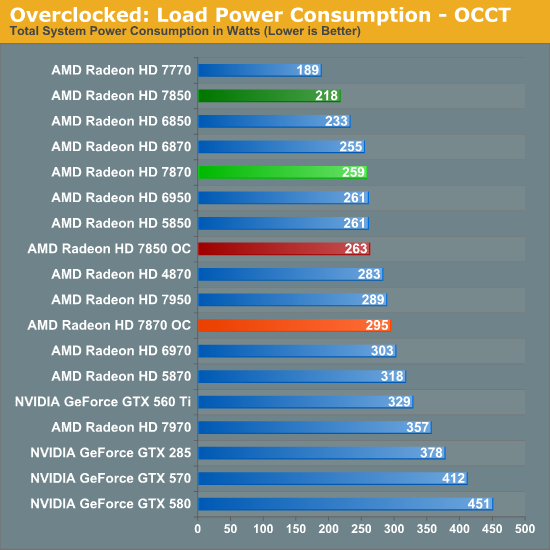
Even without a voltage increase overclocking does cause power consumption to go up, but not by a great deal. Under Metro the total difference is roughly 21W for the 7850 and 25W for the 7870, at least some of which can be traced back to the increased load on the CPU. Whereas on OCCT there’s a difference of nearly 40W on both cards, thanks to the increased PowerTune limits we’re using to avoid any kind of throttling when overclocked. All things considered with our overclocks power consumption for the 7850 approaches that of the 7870 and the 7870 approaches the GTX 560 Ti, which as we’ll see is a fairly small power consumption increase for the performance increase we’re getting.
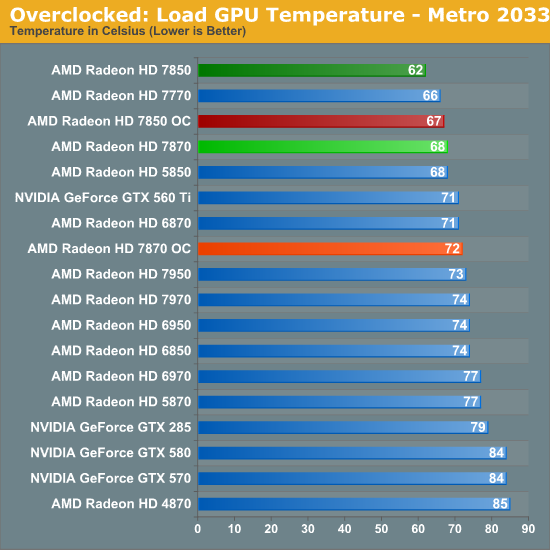
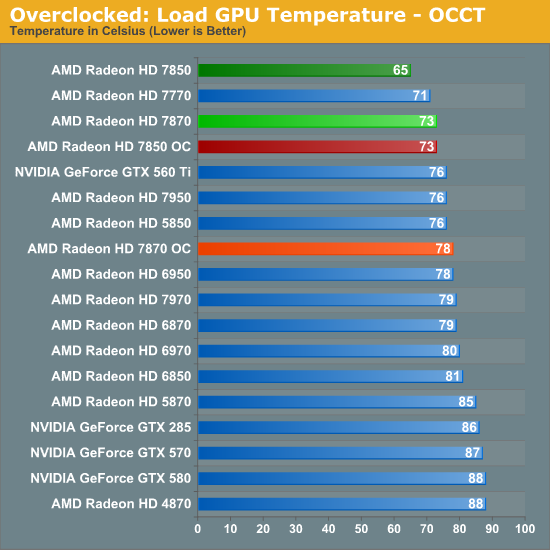
Of course when power consumption goes up so does temperature. For both cards under Metro and for the 7870 under OCCT this amounts to a 5C increase, while the 7850 rises 8C under Metro. However as with our regular temperature readings we would not suggest putting too much consideration into the 7950 numbers since it’s using a non-retail design.
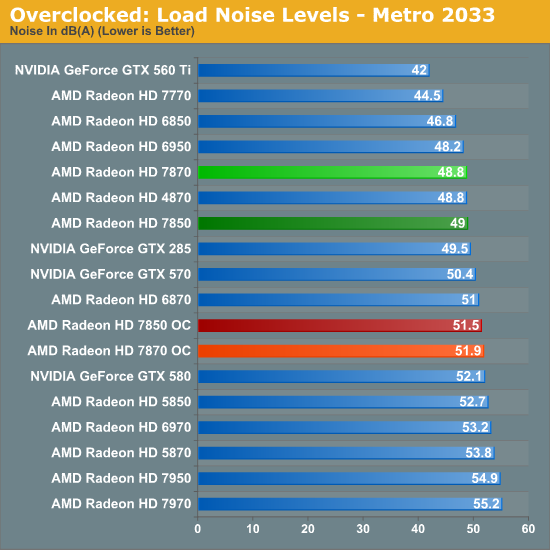
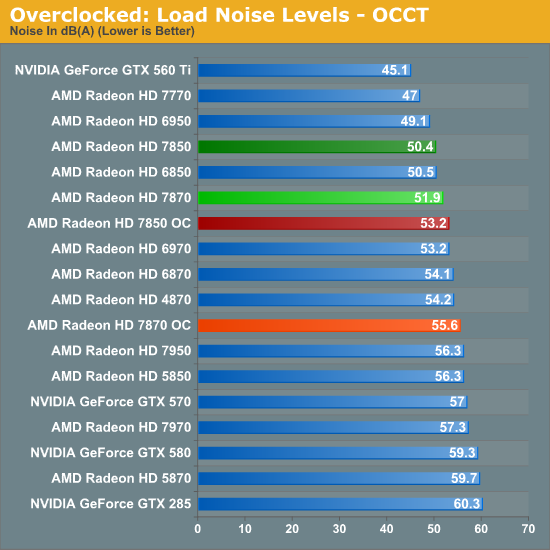
AMD’s conservative fan profiles mean that what are already somewhat loud cards get a bit louder, but in spite of what the earlier power draw differences would imply the increase in noise is rather limited. Paying particular attention to Metro 2033 here, the 7870 is just shy of 3dB louder at 51.9dB, while the 7850 increases by 2.7dB to 51.5dB. OCCT does end up being worse at 2.8dB and 3.7dB louder respectively, but keep in mind this is our pathological case with a much higher PowerTune limit.










173 Comments
View All Comments
Zumzifero - Monday, March 5, 2012 - link
I agree with you about some of your statements but not all.Price are too high and everybody seems to agree.
Then, if you are just aiming at performances I think you may find good use for some of those 69x0 still on shelves.
These 7xx0 cards have some use anyway: 7750 are great for all those budget HP and similiar you can buy in mega-store. You can play decently phasing out hose horrendous GeF 320 you get inside.
About apps supporting AMD vs Nvidia, I' may point out that recent NV drivers are castrated by choice with everything supporting a super expensive Quadro line, meaning you may find yourself much more comfortable with an obsolete GF260 then with a GT560ti. This does not applies for AMD that (as fare as it lasts) is not jeopardizing our effort to actually "work" on a "non pro" rig. I doubt you'd really need an HD7970 for Solidworks or 3DStudio (if you do, better go with a pro card), but if you spend several hours on a PC with these programs, I guess you may find interesting stuff like the much despised HD7850, which can play games, video, multi monitor systems and professional apps without killing you with the energy bill.
HD7970 may not be a wonder in terms of raw power (albeit being almost as fast as a 6990 or a 590) but it actually draws less then previous generations while being so much faster.
Still, prices are high, which I don't like, but, would you be the CEO at AMD, how would you have behaved knowing that, until Nvidia comes out with it's line costumers have no alternatives for PCI 3.0 and DX 11.1? they know they will be able to lower these prices substancially if needed.
I'm a causal gamer, and an architect, and the programs I need are not Quadro or FirePro certified so I can happily live with mainstream graphic cards. I'm using a GTX560ti but I plan to build a new rig based on Ivy Bridge 3770, ITX 2HD Raid 1, 2 SSD (one for HD caching) inside quite small Lian Li P08...
Since IvyB is not out yet I guess I'll wait and see what nVidia has to offer, but how bad do you think a 7850 would be in it?
Last but not least, US is not the world, and AMD sells globally: do you know how much higher are energy bills outside your country? You can find nfo on this site if you are interested.
Given the nVidia trend since GT200 serie (meaning horrendous power/speed ratio), I don't held my finger crossed about Kepler. I hope I'm wrong.
chizow - Monday, March 5, 2012 - link
Its not about the % of people who own those cards, its that those are the people who would most likely be in the market for one of these GPUs since they've already bought in that range.Anyone who bought a GPU in the last 24-30 months has very little reason to buy one of these cards as its really not offering any significant increase in performance that they couldn't have gotten at the same price points over the last 24-30 months. That's the problem.
Sure there's some power consumption benefits from these new parts, but that's usually just a by-product of the die shrink that's a bonus that's far lower concern than actual price and performance.
For someone buying their 1st GPU today yeah it makes more sense to buy this over an older part, but for the rest of the market, there's really no progress here with AMD's 7-series line-up.
Alpert - Tuesday, March 6, 2012 - link
I registered a account here just to reply to you, now don't you feel special. Well you should because you can't see that the 7870 is priced $200 below that of a GTX580. So I don't understand what you mean by saying"price/performance. Southern Island has been a huge disappointment so far".
That don't make sense, My only complaint is a miserable $20 that is the cards being $20 over priced.
Zoomer - Wednesday, March 7, 2012 - link
SI is about compute, not raw gaming performance. That's where much of the transistor budget went.The deep idle state probably didn't help as well. Wonder how much area that took. I doubt 7W in a desktop environment matters, as even in a crossfire setup, that's just 14 W. For laptops, sure. For dense compute clusters, maybe, if it's going to be idle.
steambuns - Monday, March 5, 2012 - link
Never expected them to be this fast!!they have not shown up with online stores yet, cannot wait to pick one up
$350 for the speed of $500 cards works for me.. 7870 in my future plans.
venomblade - Monday, March 5, 2012 - link
The 7870 looks perfect for me! Was kinda hoping for a $300 pricepoint, but for this kind of performance I'd be more than willing to shell out a bit more. And wow looking at the skyrim benchmarks when the vram made the fps crash was just daunting. At first glance I was wondering how could the 570 and up be two times faster than a 560 ti in Skyrim. Also, not a big deal but you put "GTX 570 ti collapses beyond 1920."jjj - Monday, March 5, 2012 - link
This is not even funny and the sad part is that AMD is being nasty and pullng the 69xx series since they were a better deal (the 6970 started at 300$ after price cuts and/or MIR).The entire 7xxx prod line is a huge dissapointment price wise,for now.
tynopik - Monday, March 5, 2012 - link
why don't you use the gpu benchmarks that people actually care about? bitcoin, F@H, even RC5-72also various elcomsoft and other password recovery tools use the GPU
Ryan Smith - Monday, March 5, 2012 - link
Hi tynopik;We've actually considered all of those programs, but we've rejected them for various reasons.
Bitcoin: Hand optimized assembly that works poorly with brand-new cards
F@H: Works poorly with new AMD cards. Also, difficult to benchmark
RC5-72:Hand optimized assembly that works poorly with brand-new cards. Also, it's basically a proxy test for a fast ROTL operation.
Password Tools: Basically a proxy test for having many simple shaders, and a proxy test for a fast ROTL operation
Basically with the possible exception of F@H, all of those programs are the same type of edge case for AMD's old generation hardware. Which is not to say that they're not important, but we don't pick our compute benchmarks just to evaluate the relative performance of video cards. We also pick them to better understand their architectures and their strengths & weaknesses; those benchmarks would not have told us much of value about Fermi or GCN.
kreacher - Monday, March 5, 2012 - link
I was also considering an upgrade from my 5850 and was waiting for 7800 series. Really disappointed to see the small performance gains after two generations.